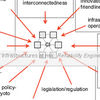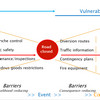 It’s time for another blog review, and this month’s featured blog has been on my radar for quite some time. Looking at the date stamp on the original draft, it has actually been on my mind (or actually not) since 14 November 2009, that is 18 months almost to the day. It is Tim Cummins’ Commitment Matters. In Tim’s own words, it is a blog that will be of greatest interest to those who select, negotiate or manage relationships with trading partners – customers, suppliers, strategic alliances, teaming agreements or channels. A bold statement, but Tim holds what he promises. Tim surely knows his way around business relationships and how they can make or break a company and he stays true to his tagline, which reads Managing Trading Relationships in the Global Networked Economy. A blog for our time?
It’s time for another blog review, and this month’s featured blog has been on my radar for quite some time. Looking at the date stamp on the original draft, it has actually been on my mind (or actually not) since 14 November 2009, that is 18 months almost to the day. It is Tim Cummins’ Commitment Matters. In Tim’s own words, it is a blog that will be of greatest interest to those who select, negotiate or manage relationships with trading partners – customers, suppliers, strategic alliances, teaming agreements or channels. A bold statement, but Tim holds what he promises. Tim surely knows his way around business relationships and how they can make or break a company and he stays true to his tagline, which reads Managing Trading Relationships in the Global Networked Economy. A blog for our time?
Forgotten…almost
I have to be honest here: I had completely forgotten about this blog, and I would probably not be writing this review – not now for sure – were it not for the fact that Tim linked to me in one of his recent posts by referring to my post Acts of God, Acts of Man, a post that describes and discusses how we humans willingly put ourselves and our critical infrastructure in harm’s way…time and again, as if we never learn. That’s how I was reminded of Tims blog, and that’s when I decided that Tim’s blog was up for my monthly blog review.
What is “Commitment Management”?
On his About page, Tim Cummins says that
As the business world depends more and more on creating integrated supply capabilities through networked relationships, and as those relationships increasingly cross traditional boundaries of industry, geography and culture, success will depend on developing a core competency in ‘commitment management’.
Now, my question is, what is this “commitment management”? Searching Tim’s blog for an answer I was unable to come up a clear definition, but if a relationship is considered a commitment, then it is all about managing your business relationships across all levels of commitment. Right, Tim?
Supply Chains, Risk and more
Tim blogs on a wide range of subjects and he never seems to run out of anything interesting to share with his readers. That shouldn’t come as a surprise though, because Tim founded the International Association for Contract & Commercial Management (IACCM), a non-profit organization that has become the global forum for innovation in trading relationships and practices, and many of his post topics are drawn from meetings or seminars within the IACCM.
Blog Highlights
FYI, here is a sample of blog posts from Commitment Matters:
In Doing Business with China he takes an unusual perspective and reflects about the Chinese experience of dealing with foreign firms, where
Business is typically conducted on purchase orders and the fear of local competition means that they feel they must accept whatever terms the customer presents. These companies lack market and contract sophistication and the foreign corporates frequently take advantage of that. They think little about imposing arbitrary changes to the contract and the level of overdue and bad debt is high.
Compare that to my post on Mary B Teagarden’s Learning from Toys. Perhaps the quality issues and product recalls are our own faults?
The old adage that most large companies would never sign their own contracts is the subject of his post on Hypocrisy In Contracting, where Tim asks why companies continue to impose burdensome terms on their supply base when it is really not in their own interest to do so?
This is an important question for executives, lawyers and contracts professionals to answer. And it is something that any negotiator should be exploring as they seek to improve contract terms with their trading partners, or to understand the sincerity of their corporate culture. Addressing this hypocrisy would represent an important break-through for the integrity and quality of contracting – and a few market leaders have started to understand this point.
This reminds me a bit of my own post on Thomas Choi’s Triads in supply networks and his 9 combinations of balanced and imbalanced relationships. Contract terms are important in securing well-working relationships.
Trade relationshhips are a way of securing the future, he writes in The Disaster Scenario, contending that trade brings innovation, and innovation brings progress:
If indeed it is trade that sits at the centre of our future success and our ability to prevent disaster, then the contracts community has a large and heavy responsibility to ensure it is not only removing barriers to to innovation, but that it is also itself innovating in the methods through which trade occurs. We have a duty to ourselves and others to ensure that we contribute to the cultural and economic forces behind human progress.
Are beneficial trade relationships the new corporate social responsibility? Perhaps. I for one hope so.
Conclusion
The above are just a tiny sample of what Tim writes. His blog posts are usually short and quickly read, but hopefully not quickly forgotten, as many of them – actually: all – are to the point and highly thought-provoking. Although I didn’t read all of his blog in preparation for this review, I didn’t find one boring post among those I perused, and I’m sure that you my reader will enjoy Tim Cummins’ blog just as much I do. Commitment does matter, and without commitment no business can exist in the long run. Above all, what Tim is trying to teach us, I think, is that profit-maximization and cost-savings are not sound forms of commitment.
Link
- tcummins.wordpress.com: Commitment Matters
- iaccm.com: International Association for Contract & Commercial Management
Related posts
- husdal.com: Hiperos and Supplier Risk
- husdal.com: Book Review – Procurement Risk












